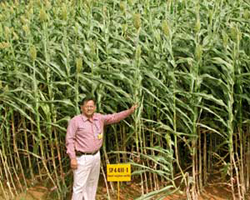
December 2008: The International Crops Research Institute for the Semi-Arid Tropics (ICRISAT), a research center of the Consultative Group on International Agricultural Research (CGIAR), published an overview of achievements, research needs and outlook for sweet sorghum as resource for pro-poor biofuel development. The article, published in ICRISAT’s newsletter on the State of the Art on Semi-arid Agriculture (SASA), describes the work of ICRISAT’s BioPower Initiative on the use of sweet sorghum for food, fodder and as feedstock for ethanol production in different countries.
The BioPower initiative, which was launched in April 2007, focuses on sources of biomass for fuel production that do not compete with food production and provide opportunities for reducing poverty of dryland residents by increasing bioenergy self-reliance, providing income through pro-poor biofuel markets, and sharing bioenergy knowledge. ICRISAT has evaluated the performance of sweet sorghum with regard to food-fuel tradeoffs, economic viability and its contribution to rural development, and environmental impacts, in particular carbon balances. Furthermore, the article includes sections on: sweet sorghum as a “smart crop;” sweet sorghum compared to grain sorghum, maize and sugarcane; state of research; existing hybrids; second generation-ethanol production (cellulosic technology); state of technology utilization and commercialization; and outlook. The article notes that preliminary research suggests that sweet sorghum has potential to be used as bioenergy crop. Future research should focus on: developing improved varieties that increase food, fuel and feed yields and quality; improved production, harvesting and processing technology to optimize nitrogen use efficiency, economic efficiency and carbon balances; and socioeconomic research and policy analysis to accelerate technology adoption while monitoring the distribution of benefits to ensure that pro-poor outcomes are realized. [The Article] [BioPower Website]
ICRISAT’s BioPower Initiative Develops Biofuels from Sweet Sorghum
story highlights
8 SDGs
Sustainable Ci...
Climate Action...
Partnerships f...
Zero Hunger
Good Health & W...
Clean Water & S...
Affordable & Cl...
Industry, Innov...
8 SDGs
Sustainable Ci...
Climate Action...
Partnerships f...
Zero Hunger
Good Health & W...
Clean Water & S...
Affordable & Cl...
Industry, Innov...